
Close but no cigarette: When Milligan & Sellers met Benson & Hedges
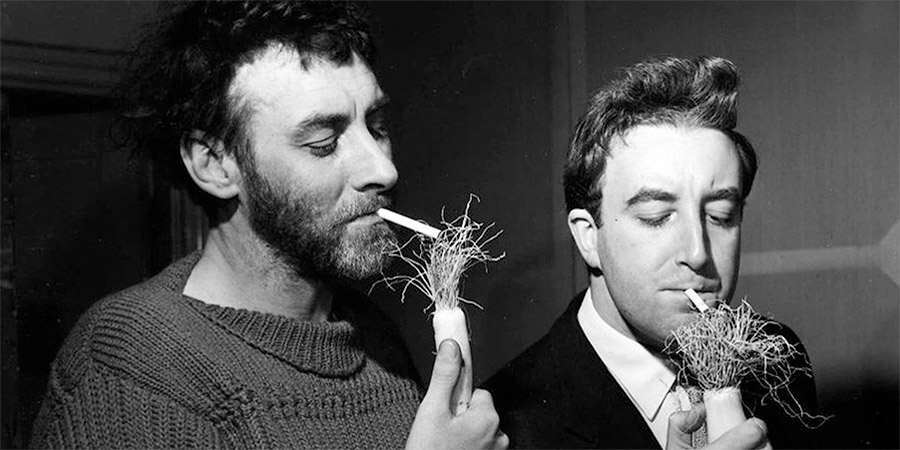
They were filming a cinema commercial at Kyrenia harbour in Cyprus. It was a Sunday, very hot and very sunny. Spike Milligan was there, and so was Peter Sellers. What could possibly go wrong? The answer, of course, is: just about anything and everything.
The making of the commercial, to put it into context, was coming towards the end of an extraordinarily traumatic set of experiences for all concerned. There had been bitter arguments, angry departures, grudging returns, innumerable betrayals, fierce power struggles, legal threats, physical threats and wild and wide-eyed fist fights; it was actually quite a surprise that everyone, by that stage, was still there standing upright and in one piece.
It had all started in 1973, when Peter Sellers was working on a new movie - a 17th-Century pirate comedy - called Ghost In The Noonday Sun. Feeling in need of support from an old friend, he asked Spike Milligan to come on board. It was not a decision that struck many others as being particularly prudent.
Milligan, of course, had a reputation for being difficult and unpredictable. When his mood turned dark he would lock himself away in his office and not come out for several days. A mildly critical observation in a studio could spark the most explosive of responses ('I smashed up a room at Broadcasting House once, all the furniture, because producer Dennis Main Wilson said something to me'). He also once threatened to shoot his then-co-stars Graham Stark and Bill Owen, and attacked a stage doorman with a walking stick.
Sellers, of course, had a reputation for being even more difficult and unpredictable. This was a man who refused to venture out on to a set without having first seen a favourable horoscope, and who insisted on neither wearing nor seeing anything green or purple while shooting on the grounds that they gave him 'strange vibrations'. He would sometimes either accept or reject advice on the grounds that his supposed spirit guide, the ghost of Victorian music hall performer Dan Leno, had told him to do so, and once called the Pink Panther director Blake Edwards in the middle of the night to inform him that God had just instructed him how to play the next scene that they were due to shoot. He also strolled off a set in London, mid-scene, saying that he was just 'popping to the shops', and was next seen in Sweden.
The director Joe McGrath, in his excellent yet-to-be published memoir Peter, Orson And Me, recalls the time when Sellers demanded that Orson Welles be hired to act opposite him in Casino Royale, only to resent the man's eminent presence so much that he refused to appear with him in the same shot. 'I said, "Aw, Christ, Peter, you are behaving like a spoilt child". Then he punched me in the face.' McGrath, being a Glaswegian, did the sensible thing and hit the star straight back, but Sellers caused him countless other problems. 'Even on a good film,' he would reflect, 'it was never fun.'
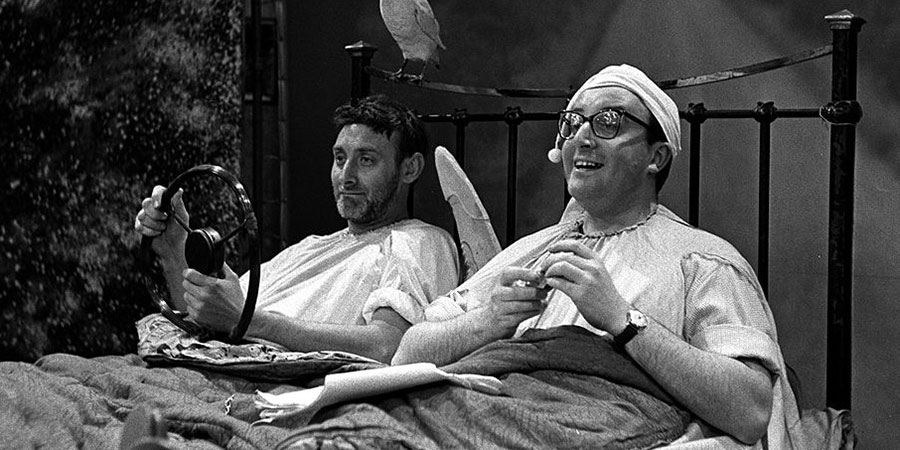
One of the few things that could make both Milligan and Sellers even more difficult and unpredictable was when they happened to spend any significant amount of time together. Few relationships, few friendships, were quite as combustible as theirs (as one person who worked with both of them put it, 'They were like two catalysts of a nuclear bomb').
Both men were damaged. Milligan had suffered shell shock from a mortar explosion in Italy during the war, and had been dogged by mental health problems ever since. Sellers had been hit by a series of heart attacks in 1964 - as many as thirteen over the course of a few days - and, in the opinion of many of those who knew him, was left psychologically unstable from the trauma.
They lived together for a while in the same apartment block in London, door facing door, but Milligan would end up claiming that having Sellers as his neighbour was one of the reasons for his first nervous breakdown. It happened at the end of 1952, a month after the birth of his first child (and the start of his wife's subsequent incapacitation due to a serious post-natal fever) and one month into the third gruelling series of The Goon Show. Weighed down by money worries, struggling against an insomnia that was being exacerbated by his noisy neighbour Sellers (who had a habit of playing his latest batch of records loudly in the middle of the night), and battling against all of those censorious bureaucrats (real and imagined) whom he took to be his enemies at the BBC, Milligan had been suffering for some time:
The madness built up gradually. I found I was disliking more and more people. Then I got to hating them. Even my wife and baby. And then there were the noises. Ordinary noises were magnified in my brain until they sounded a hundred times as loud as they were, screaming and roaring in my head... [Finally] I thought, 'Nobody is on my side. They are letting me go insane. I must do something desperate so they will put me in hospital and cure me. I know what I'll do. I will kill Peter Sellers'.
Picking up a potato knife that he found on the draining board by the kitchen sink, the semi-dressed and wild-eyed Milligan bolted out of his flat and across the hallway, and ran straight through Peter Sellers's glass-plated front door. He did not even know whether his old friend was actually in residence there at the time; he was flat out on the floor and in a trance, covered in flecks of blood and shards of glass. His shocked wife summoned a doctor, who decided to send him to a nearby psychiatric hospital - St Luke's - in Muswell Hill, where he was put in a straitjacket and placed in an isolation ward.
On a later occasion, when Milligan was back out and about and writing scripts, a terrified young BBC radio employee burst into his boss's office to tell him that a furious-looking Spike, following an argument over a sound effect, had just been seen racing out of Broadcasting House and heading off down Duchess Street towards Peter Sellers's new apartment while brandishing an air pistol. When a couple of breathless colleagues eventually caught up with the pair of them, they were found sitting amicably together on a sofa, munching on crisps and talking about styles of shoes.
That was Milligan and Sellers. Sometimes they calmed each other down. Sometimes they wound each other up. No one - not even the two men themselves - would ever know what effect, on any particular occasion, their being together might ignite.
Why did they keep working together, and, perhaps more to the point, why did other people keep letting them work together? The best answer probably came from their mutual friend, the scriptwriter Ray Galton: 'Because the good times are good and the bad times don't last for ever.'
That is as enlightening a reason as one will get to explain why, in 1973, Peter Sellers decided that it would be a good idea to summon, yet again, Spike Milligan to join him in making Ghost In The Noonday Sun. It is also as enlightening a reason as one will get to explain why Milligan agreed to do so.
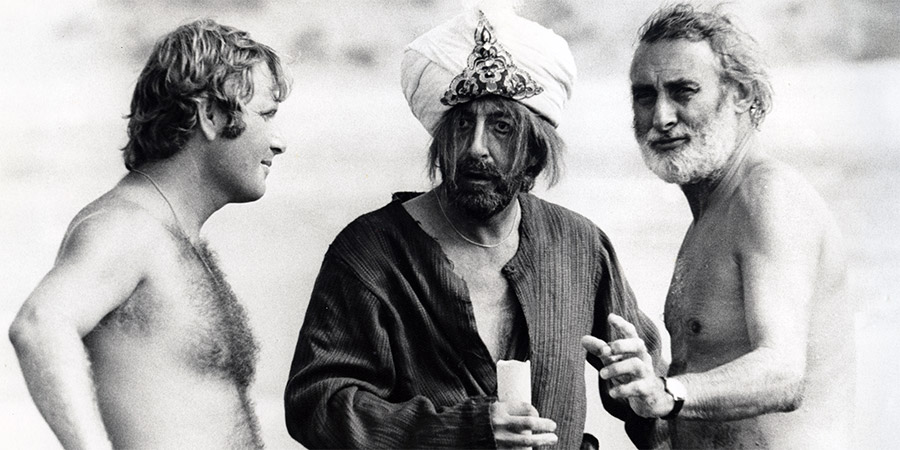
Wolf Mankowitz had written the first version of the screenplay, as what was described at the time as 'a straight pirate yarn', but then at least ten other writers worked on it before Evan Jones tailored it to better suit the special comic talents of Sellers. The young Hungarian director Peter Medak had been hired to film it, mainly because Sellers had greatly admired his recent movie The Ruling Class (1972), a dark and wild satire which featured a paranoid schizophrenic British nobleman who thinks he is Jesus Christ or Jack the Ripper.
The production of Ghost, right from the start, was a disaster. Neither for the first nor the last time, Sellers had been seduced by the idea of a movie only to become repulsed by the prospect of actually having to make it. He already wanted out even before he was really in.
'Catatonically depressed,' according to his colleagues, by the recent end of his brief but intense relationship with Liza Minnelli, he arrived in Cyprus in the foulest of moods. The first thing he did when he set foot into his elegant rented villa was to open a copy of Who's Who, look up the entries on the movie's two well-respected producers, Thomas Clyde and Gareth Wigan, and then declare that both of them should be fired for being 'incompetents'.
Medak, meanwhile, was already trying to fight off his own creeping feeling of doom. He and his crew had just watched in helpless horror as the pirate ship that had been re-built at great expense finally sailed in from Athens and was allowed by its drunken Greek captain to crash straight into the quay at Kyrenia. That set the tone for the entire production.
The first week of shooting was undermined by the fact that no one, surprisingly, had anticipated just how difficult it was to film scenes on a ship at sea - the waters were choppy, the vessel was constantly rocking and rolling, the light kept changing, the smell of diesel was sometimes overpowering and countless members of the crew were vomiting over the sides. Things were hardly any better on dry land, where most of the local extras, taking umbrage at the fact they were not being given a free lunch alongside the 'proper' actors, walked off still wearing their costumes and were never seen again. 'This is absolutely fucking crazy,' raged Sellers. 'It's impossible to make a comedy like this!'
The second week was even worse. In the middle of a scene, Sellers suddenly groaned, clutched his chest and fell to the floor. Medak, fearing that his star had suffered another heart attack, had a helicopter fly him off to the nearest hospital while the production, in his absence, shut down. Two days later, when the director was relaxing by the harbour reading an English newspaper, he was amazed to turn the page and see a photograph of a happy and healthy-looking Sellers in London, leaving San Lorenzo restaurant in the company of Princess Margaret.
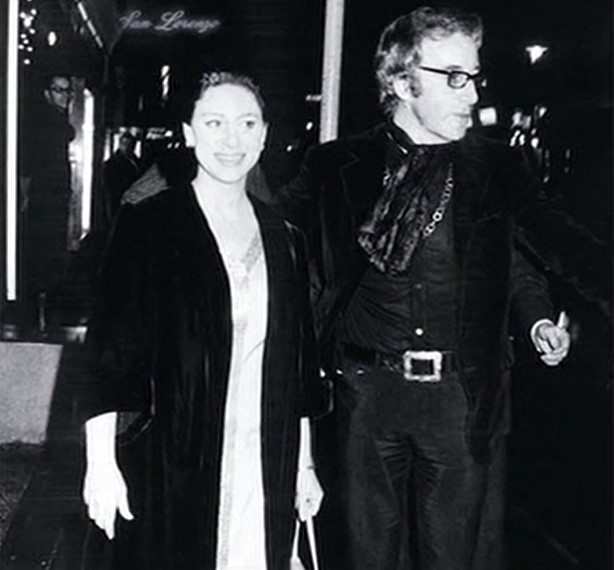
The actor grudgingly returned to the set a couple of days later, having persuaded a friendly doctor to write him a bogus medical certificate declaring him unfit to resume working. The ruse failed to work, but Medak knew that he was now stuck with a dangerously mutinous star. 'From that point on,' he would say in his fascinating cinematic memoir of this sorry saga, The Ghost Of Peter Sellers, 'he decided that he has to get off the movie somehow, so he did everything to sabotage it.'
Sellers (bizarrely channelling his old I'm All Right Jack character of Fred Kite) elected himself shop steward for all the cast and crew and tried unsuccessfully to persuade his 'members' to pass a vote of no confidence in the director. He also tried to get the financiers to fire Medak, but the financiers were only interested in finishing the film as quickly as possible and moving swiftly on.
Still determined to bring the whole production crashing down around him, Sellers then tried missing as many of his appointed moments on camera as possible - wasting fourteen whole days in total - thus pushing everyone else further and further behind schedule and depressingly over-budget. Even when he did deign to be on set, he rarely communicated with his director and disregarded most of his instructions.
His behaviour, by this stage, was not just infuriating Peter Medak. It was also sending most of the rest of the cast and crew into a rage as well.
No one became more passionately - and dangerously - indignant than Sellers's co-star, Anthony Franciosa. Although the two men were, ostensibly, fairly good friends, Franciosa - a charming but notoriously short-tempered leading man - was so appalled by his fellow actor's shameless unprofessionalism that, after being kept waiting one too many times by Sellers, and then being inexplicably taunted by him, he ended up wanting to kill him.
They had a duelling scene to film. During a break, Sellers was leaning over the poop deck, and Franciosa crept up behind him, pulled out his pirate's sword, held it up high with both hands and then brought it down swiftly over Sellers, stopping only a few inches away from the top of his head. When Sellers's loyal driver, Bert, explained the near-miss to him, the ashen-faced star tore off his wig, hurled it into the sea, and marched over to tell Medak: 'I know what happened, and I'm never, ever, going to be in the same frame with Tony Franciosa again!'
From this moment on, Sellers hated his co-star as much as he hated his director. In fact, he now seemed to hate just about everybody. He locked himself away in his villa and refused to come back out.
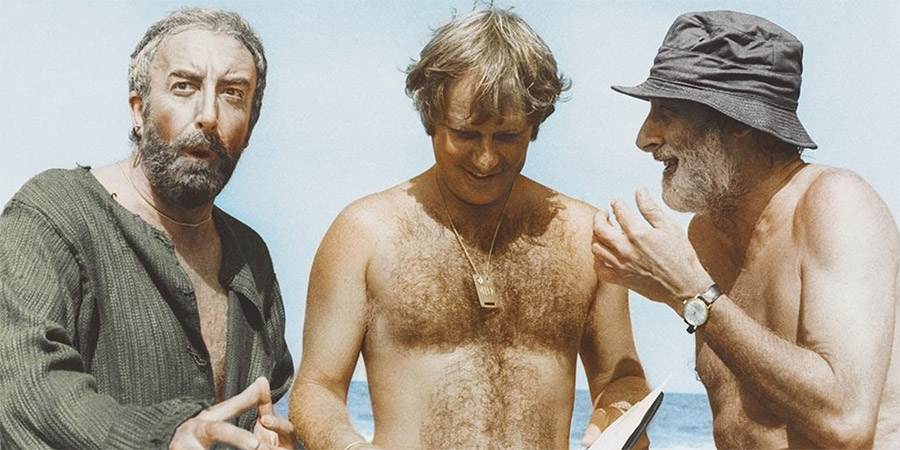
It was at this point that Sellers made yet another dramatic announcement. He called the producers back in London and told them that he was going to walk off the movie unless Spike Milligan was flown over and allowed to re-write 'most of the scenes', and Medak would have to film those scenes 'whether he agreed with them or not'. The producers, fearing a financial disaster if the star dropped out, consented reluctantly.
Milligan, therefore, arrived a few days later in Cyprus, accompanied by his agent, Norma Farnes, and a case full of tranquillisers, sleeping tablets and uppers and downers. 'Everything will be all right now that Spike's here,' a suddenly cheerful Sellers declared, and only he seemed surprised when everything did not end up all right at all.
There was, at least, a brief cessation of hostilities. Milligan (who had prepared for the project by growing his grey hair long and his white beard wild) reassured Sellers that he would make the film funnier, but he also let Peter Medak know that he would try to help him regain some control. The result was a few precious days of surprisingly pleasant and civil behaviour. 'We had dinners [together] in the evening,' the director would recall, 'and everybody was getting stoned, and we had a lot of fun.'
Soon, however, the bad old days were back. Sellers was just as exasperatingly difficult and irrational as before. On one occasion, for example, he refused to work because he had suddenly decided that a favourite vase in his Swiss home might be facing the 'wrong way', which would send out the wrong kind of vibrations over to him in Cyprus, so he phoned his long-suffering secretary and told her: 'Fly to Gstaadt and take the vase back to London'. It was only once this task had been completed, three days later, that he consented to step back on to the set.
Milligan, meanwhile, was causing Medak a whole new set of problems as he tore through the current screenplay at alarming speed, eschewing the need for coherence as he concentrated on inventing a bewilderingly random collection of new characters, scenes and storylines. One of his contributions, for example, called for as many of the cast as possible to dress up to resemble...Spike Milligan. 'Spike didn't really understand film,' his director would reflect ruefully.
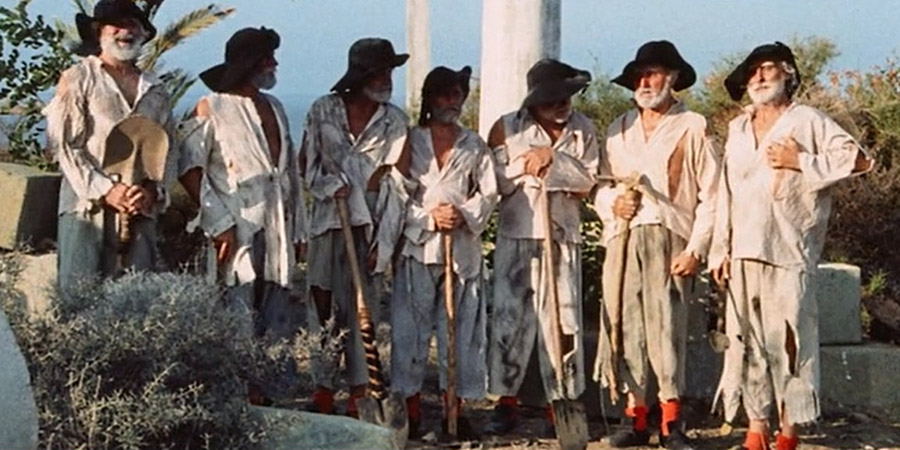
This was the moment in the long and painfully troubled production - with the script in an unprecedented mess, the shooting still many days behind schedule, the director feeling hopelessly isolated and impotent and the star being increasingly unreliable - that the fresh hell of a cinema commercial came on to the agenda. 'Darling,' a suddenly-smiling Peter Sellers said to his startled director, 'in ten days' time, we start night shooting. So the Sunday before is free and I've decided to shoot this Benson & Hedges commercial I've told you about, and, because I love you, I want you to direct me and Spike in it.'
A stunned Medak just stared at him for a moment in disbelief and then said: 'I can't even get this fucking picture finished because you won't speak to me directly and now you want me to do this commercial on the only day I can rest and sleep? Get some other fucking idiot to do it, or do it yourself. It should be easy for you because you know everything better than anyone else!'
Sellers merely looked back at him with an innocently puzzled-looking 'Who's upset my friend?' expression on his face. 'I'm getting fifty thousand pounds,' he continued brightly as if nothing untoward had just happened, 'and I'm getting a new Mercedes.' He went on to explain that, aside from his own huge fee (which would be well over a million pounds by today's rates, and tax-free), Milligan would be getting twenty-five thousand pounds, and he had also arranged for another member of the cast, James Villiers, to join them for a fee of two thousand pounds. The fee for the director would be three thousand pounds.
Medak, sighing, realised that there was no point in arguing. It was obvious that it would be happening whether he was involved or not. He decided, therefore, to agree to direct the commercial simply in the hope that it might put his star in a better frame of mind to finish this wretched movie (and, failing that, at least the fee would help pay off his mortgage).
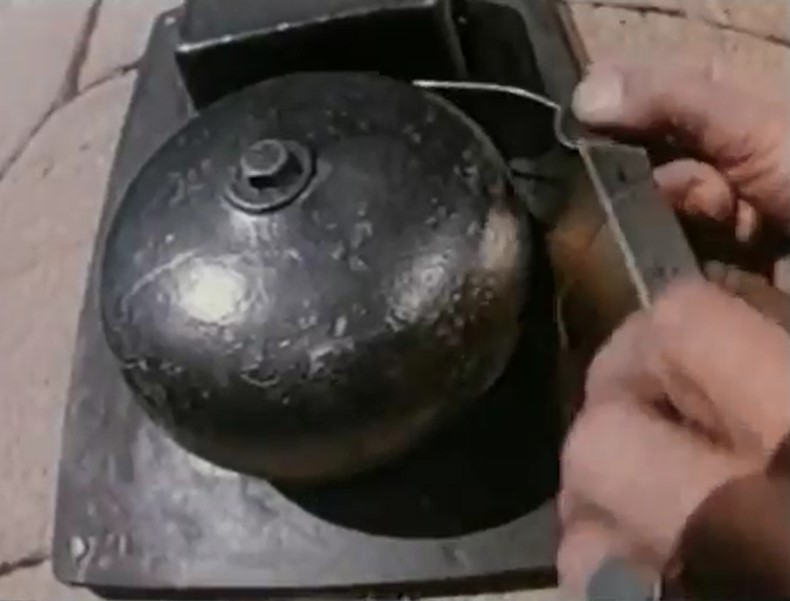
The plot of the commercial was simple enough. Sellers, Milligan and Villiers were supposed to be a trio of rascals who were breaking into a customs warehouse full of gold bullion. In order to avoid detection, Sellers had to jam a Benson & Hedges cigarette packet into the alarm bell so that it would fail to ring, and then, once inside, Milligan was required to open his capacious white raincoat and have gold bars stuffed into multiple pockets. Then, as they left, Sellers would pick up another glowing gold packet of Benson & Hedges and, once they were safely back outside, he would open it up for a celebratory smoke, find that it was empty, and so reach up and remove the other pack he had stuffed in the alarm, thus setting it off.
Medak went up to him and explained the key shot, which had already been discussed by all concerned and duly storyboarded and studied. The lighting was going to shine on the gold packet as he held it in his hand - that was to be the money shot. Sellers, however, had a problem.
'Daddy,' he said - he had suddenly decided that 'Daddy' was an even more affectionate appellation than 'Darling' for his former foe - 'Daddy, didn't anyone tell you I can't touch a cigarette packet? I simply can't touch it.'
Medak was incredulous. 'Are you joking? Really? You've got to be putting me on! Here we are, filming a cigarette commercial, for which you are getting paid a fortune, and now you say you can't touch the packet?'
'No, I can't,' Sellers said with an expression of Stan Laurel-like innocence. 'I'm Chairman of the Anti-Smoking League and it's in my contract that I'm not allowed to touch cigarettes. Dennis [Selinger, his agent] should have told you.'
Medak was utterly speechless. He stared at Sellers and Sellers smiled sweetly back at him, as if a minor puzzle had now been solved to everyone's satisfaction.
The red-faced and now rapidly perspiring director, shaking his head again in disbelief, then marched over to Milligan, who seemed, rather suspiciously, to be focussed solely on removing his shoes and wiggling his toes. 'This lunatic friend of yours,' Medak barked, pointing over at the still-smiling Sellers, 'won't touch the cigarette packet and flash it in the light so I can get a great shot of it. He won't touch it!'
Milligan, suddenly looking alarmed, started backing away. 'I can't touch the packet either,' he whined. 'I'm DEPUTY CHAIRMAN of the Anti-Smoking League!'
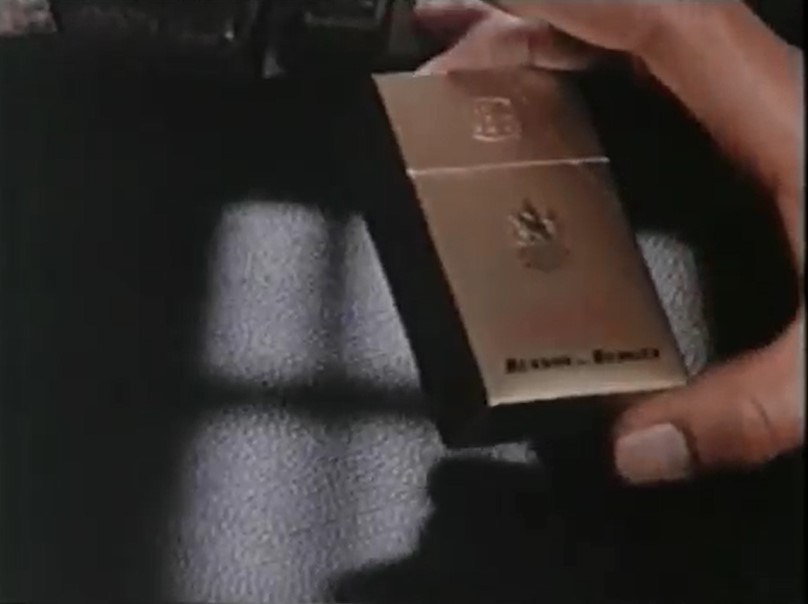
Medak was struck speechless once again. Milligan, however, was insistent: 'Don't ask me to do this,' he said, looking pained and embarrassed, 'because I'll have to say no and I don't want to say no to you.'
Medak, gasping as though he had just been punched in the stomach, looked back and forth at the two men, still not quite sure that any of this was actually happening. He asked both of them again: 'You're putting me on, aren't you???' Both of them shook their heads and assured him that they were being completely serious.
The director looked up at the heavens, his arms held aloft and his hands clenched tightly into white-knuckled fists. 'I'm surrounded by two fucking IDIOTS!' he shouted at the clear blue sky.
He then walked over to James Villiers. 'Jimbo, these two idiots won't touch the cigarette packet,' he cried, 'and they are getting £75,000 between them!' Villiers, always an equable and affable sort of character, reflected with a chuckle that most of his own far more modest fee would probably end up being used to settle his bar bill, and then, much to Medak's immense relief, he gave a wink and asked: 'Where's the bloody cigarette packet? Show me what to do.'
They thus started to shoot again. Villiers took the Benson & Hedges packet, let the light shine on the surface, and then they carried on with the rest of the action.
All that was then left for the actors to do was to scuttle off to the edge of the quayside, where Sellers and Villiers would jump down into a boat, closely followed by Milligan and his gold bars, which would, of course, send him crashing through the boat and (as Little Jim would no doubt have pointed out) straight into the water. Not even this last, apparently straightforward, stunt, however, could happen without Medak having to suffer yet another nerve-shredding crisis.
The problem this time was that Spike Milligan, knowing that he (after a stunt double had performed the actual jump) was due to bob about in the water, had taken the time to walk over and have a look at the state of the sea. It was here that, for some peculiar reason, he convinced himself that all of the strands of seaweed that were floating around on the surface were actually, as he angrily put it, 'turds'.
No amount of pleading with him managed to alter his opinion, and so, while the sun continued to beat down, the now-apoplectic Medak was obliged to stand about impatiently with the rest of his equally rattled crew while a large group of locals was assembled to board some boats and gather up every piece of seaweed into their fishing nets. Only after Milligan was satisfied that the water was now 'turd-free' did he agree to join the others for the final shot.
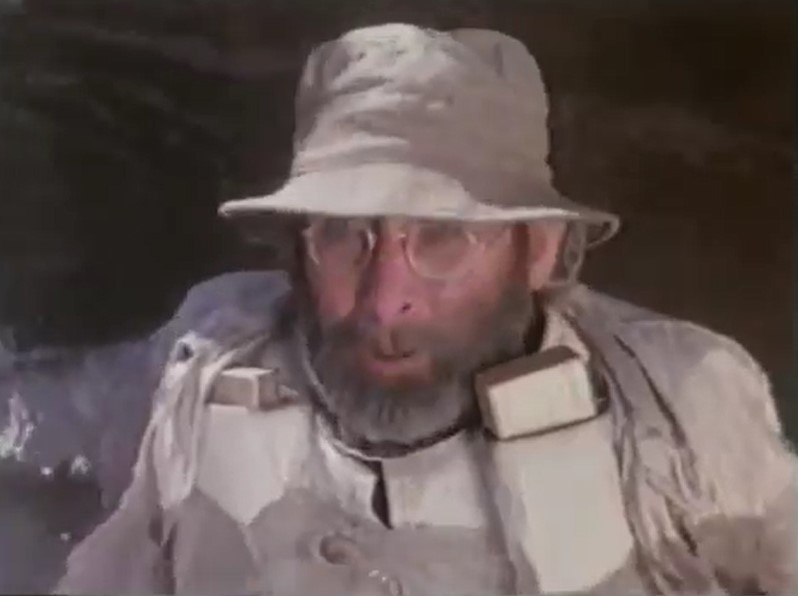
The commercial was at last in the can, but, this being a Milligan-Sellers collaboration, there was no neat completion to this little adventure. After everyone ended the long day of filming tired but in very good spirits, sharing plenty of drinks and spliffs, one of the participants woke up the following morning with a very sore head and a very troubled mind.
It was not Peter Sellers. He was all smiles. He was looking forward to receiving his new Mercedes and his envelope stuffed with cash.
This time it was Milligan. There were no smiles at all from him.
'What's up with Spikey?' asked one of the crew as they noticed, from a safe distance, that he had emerged from his room in an unmistakeably foul mood. Someone else had already worked out the explanation: 'He's just realised he's done a commercial for cigarettes - which he's been on television loads of times to condemn!'
That was indeed the problem. His agent, Norma Farnes, would later tell me: 'He regretted it immediately, and was angry with himself for having let Pete talk him into it. Actually, at the time, he hadn't needed that much talking into it, but now he was adamant that he had to find a way to make amends.'
Milligan would later claim, in a somewhat risibly pompous television interview, that he had been forced to 'break my principles' and take part in the commercial purely because 'I owed a lot of tax to the Inland Revenue and I didn't know what to do about it [...] So I thought, "I've got to do this commercial to pay my tax, to be law-abiding"'.
That explanation seems decidedly disingenuous, given the fact that, at the time, he pleaded with Norma Farnes to ensure that all of the money was given away. Even the manner that he shaped this proposal, however, seemed either startlingly naïve or else just cynically impractical.
While he hid himself away in his room, Farnes was charged with the unpleasant task of delivering his demands to the owners of Benson & Hedges, the Gallaher Group. The executives at their London HQ thus listened with a mounting sense of astonishment as Farnes explained on the phone that Milligan wanted them to make his cheque payable to ASH: Action on Smoking and Health.
They looked at each other in bewilderment. 'He wants a cigarette company to pay his fee for a cigarette commercial to an organisation that spends all its money trying to stop people smoking cigarettes???'
The people at Gallaher, once they had regained some composure, informed Farnes bluntly: 'We don't mind giving any of them cash. We don't mind paying the money to their lawyers or agents. But we're simply not going to write a cheque out to ASH!' The meeting was over.
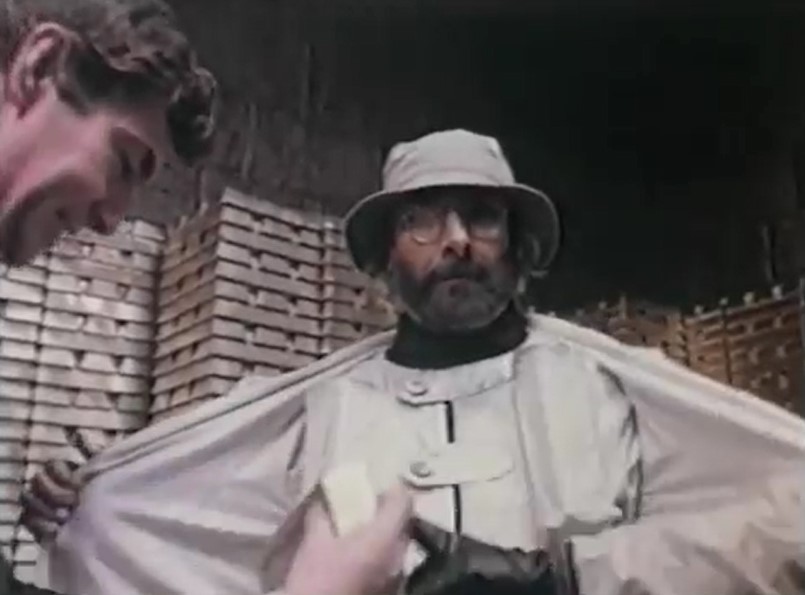
Milligan, rather sheepishly, ended up donating the fee to charity, claiming as a result to have saved three trees in Finchley. At the time, however, he was just left feeling foolish and, once Norma Farnes had departed to deal with other business back in London, very much alone.
Now that the commercial was over, the movie was resumed, and so were all the battles. Sellers once again stopped talking to Medak, and Medak once again stopped talking to Sellers. Milligan, while trying hard not to take sides, soon started arguing with both of them until neither wanted to talk to him.
Shooting continued, miserably, until, at long last, this mess of a movie was deemed as complete as it would ever be. An end of picture party had been planned, but nobody except for a couple of thirsty electricians from another project bothered to turn up. Everyone just wanted to escape. 'Somehow we got out of the island alive,' Medak would reflect with something of a shiver, 'which was a miracle.'
The battle scars would show more on some than on others. Peter Sellers simply moved on to his next fleeting fascination, his next fad, his next fling, seeming as though he had immediately clicked 'Ctrl-Alt-Delete' and wiped his memory clean of the whole sorry affair. Spike Milligan returned to the sanctuary of his den-like office in Orme Court, where, once again, he tried to put another bitter-sweet experience with his old friend into some kind of meaningful perspective.
Peter Medak, meanwhile, could not hide how shattered the ordeal had left him. His hair had turned prematurely grey, the stress had etched itself like a map all over his face, and the rapid progress that he had been making in his profession came to a cruelly abrupt halt. It would be five years before he directed another movie.
The most painful irony of all for him was that the cigarette commercial would end up being the great success, proving hugely popular with audiences and winning several industry awards. Ghost In The Noonday Sun, in stark contrast, was judged to be so bad that it never even went on general release.
Medak met Sellers one more time, several years later, when they were working on different productions at the same studios in Britain. The star greeted the director like a dear old friend. He talked animatedly about buying back the movie, and getting Milligan to rewrite it all over again. Medak, after the initial shock, enjoyed the reunion, but he knew that the revival was never going to happen. Sellers, in spite of everything that had happened, might still have thought that it was possible, but this time it was a case of: close, but no cigarette.
Help us publish more great content by becoming a BCG Supporter. You'll be backing our mission to champion, celebrate and promote British comedy in all its forms: past, present and future.
We understand times are tough, but if you believe in the power of laughter we'd be honoured to have you join us. Advertising doesn't cover our costs, so every single donation matters and is put to good use. Thank you.
Love comedy? Find out moreGhost In The Noonday Sun

Comedy directed by Peter Medak.
Having learned where the captain has hidden his treasure, a pirate betrays and kills him in order to take the loot for his own. He vows to return and claim the treasure, but when he does he soon finds his memory is failing him and he cannot remember where the loot is hidden. To find it, he'll need the ghostly assistance of the very captain he so treacherously slew. But it won't be simple to get him on board, not with another buccaneer captain showing up and meddling and a vengeful first mate pursuing him.
The cast includes Peter Sellers, Spike Milligan and Clive Revill.
First released: Monday 12th December 2016
- Distributor: Fabulous Films
- Region: 2
- Discs: 1
- Minutes: 92
- Catalogue: FHED3805
![]() Buy and sell old and new items
Buy and sell old and new items
Search for this product on eBay
BCG may earn commission on sales generated through the links above.
The Ghost Of Peter Sellers
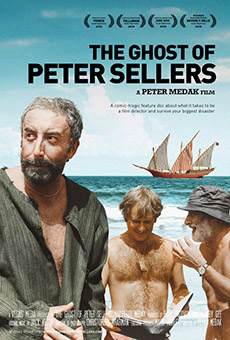
In 1973 comedic genius Peter Sellers sabotaged his own pirate comedy. Decades later, the young director on the project, Peter Medak, is still reeling from the disastrous experience and healing from the wounds inflicted by his friend, Peter Sellers, and the film's failure.
First released: Tuesday 9th February 2021
- Minutes: 93
BCG may earn commission on sales generated through the links above.

